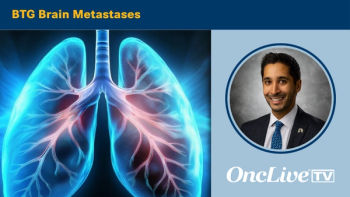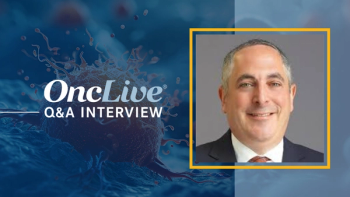
Glioblastoma: The Potential Role of Immunotherapy
Transcript:Maciej Mrugala, MD, PhD, MPH: Using immunotherapy in glioblastoma is not necessarily a super-novel concept. Nevertheless, more and more immunotherapeutic approaches are being developed and seen in brain tumors. We see vaccine approaches; this has been in the works for many years, the different vaccine types that are being used in glioblastoma. Again, the premise of this is the fact that immune response can be triggered in the response to certain antigens, and then the immune system can, in turn, be used to fight the tumor. So, that’s the idea behind that. In addition to the vaccine therapies that are being investigated, there are also drugs that are influencing the immune system. Most recently popularized by the use in other malignancies are PD-1 inhibitors, specifically drugs like nivolumab, pembrolizumab, or ipilimumab that have been used successfully in melanoma as well as lung carcinoma. These are the mainstream immunotherapy approaches in cancer in general.
Given the success in other malignancies, we are now investigating the utility of immunotherapy, specifically in primary brain tumors—glioblastoma being one of the primary targets to see if these agents can indeed help halt the disease process and extend progression-free survival and overall survival. At this point, we do not have any major phase III studies completed with any of these agents, so it’s hard to know what we’re going to see, but there’s a lot of excitement about this approach. And these drugs are being combined with other modalities—with radiation, for example—and with other antibodies, like bevacizumab.
Combination therapies with immunotherapy are exciting. It has been shown that, for example, radiation therapy by itself can cause changes in the brain that trigger multiple immunogenic or immunologic pathways, and these could be good targets for PD-1 inhibitors and checkpoint inhibitors in general. So, I think we’re going to see, in the future, more therapies that are focusing on combining treatments; let’s say radiation plus immunotherapy, or radiation plus another agent, as opposed to using immunotherapy as a single modality.
PD-1 inhibitors and checkpoint inhibitors have been utilized successfully predominantly in malignancies such as lung carcinoma and melanoma. We know that these drugs definitely can penetrate the blood-brain barrier and can work for malignancies in the brain. A more profound example is the treatment of our former President Carter who developed metastatic melanoma to his brain. He was treated with one of the immunotherapies and had a successful response.
So, we know that these drugs do get into the brain. There are several of them out there already FDA approved. One of the initial ones is a drug called ipilimumab. Some of the novel ones, nivolumab or pembrolizumab, are also approved for treatment of both melanoma and lung carcinoma. I think it was a natural evolution to see if these agents could be utilized in other types of malignancies, specifically primary brain tumors such as gliomas, but also lymphoma.
There are several projects currently ongoing looking exactly at that to see if patients who harbor glioblastoma can respond to these agents. I think, at this stage, we could speculate, but it’s too soon to know if these agents would have meaningful impact on survival of the patients with primary brain tumors. And I think one other issue that we’re worried about is the side effect profile. Because these agents modify the immune system and modify immune responses, they tend to create inflammatory reactions which, especially in the brain, may not be harmful but certainly can impact patients’ symptoms due to the nature of the location of the disease. So, I think we’re still learning more about the efficacy of these drugs, but also learning about the side effects and a response to them.
It has been known from prior experience, especially in melanoma, that immune therapies can make the disease worse, if you will, before it gets better. I think the key in utilizing this drug is to know that you need to wait. You need to wait for the response. It’s not going to be an instantaneous response to treatment. It’s probably going to take multiple doses. It’s probably going to take weeks to months to actually see the response. These are all questions that we need to answer. Also, given the location of the tumor and the imaging technologies, we need to understand the changes that these therapies cause to the brain and to the tumor itself to then interpret the MRI imaging, and understand if what we are seeing is tumor progression. Is it a response to treatment, is it what we call “pseudo-response” or pseudoprogression? So, these are all questions that everybody is really excited about, but they’re also causing a lot of anxiety in the field because, obviously, it’s an unknown, uncharted territory at this point. And we’re not only learning if these treatments will be successful, but we’re also learning about what will they do to the healthy brain and to the diseased brain, and how to interpret the findings.
Transcript Edited for Clarity




































